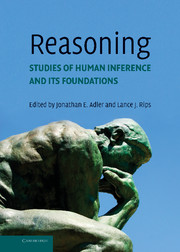27 - Reflections on Conscious Reflection: Mechanisms of Impairment by Reasons Analysis
Published online by Cambridge University Press: 05 June 2012
Summary
Western culture has an ambivalent relationship with rationality, displaying a reverence for reasoning, objective evidence, and science, accompanied by a strong suspicion of them. Individuals respect logic and rationality, but often only when there are consistent with their intuition, and a common lay belief is that some, even most, judgments are best made on the basis of one's “gut feelings.”
Is analytic thought good or bad? Perhaps not surprisingly, the answer lies in the theoretical expanse between these extremes. Researchers have become increasingly interested in this expanse, concluding that people are right to trust their intuitions under (at least) some circumstances. Studies of nonconscious judgments, automatic evaluations, and functional heuristics, for example, all show that people can and do make good decisions based on quick, unanalyzed responses (Bargh and Chartrand 1999; Damasio 1994; Dijksterhuis 2004; Gigerenzer 2000; LeDoux 1996; Wilson 2002). But it is also clear that people should not always trust their intuitions, which can be contaminated by unwanted or invalid information, often in ways in which people are unaware, as shown by research on the misuse of heuristics, biased information processing, and automatic prejudice (Devine 1989; Gilovich, Griffin, and Kahneman 2002; Greenwald and Banaji 1995; Nisbett and Ross 1980; Tversky and Kahneman 1974; Wilson and Brekke 1994).
In this chapter, we explore how conscious reflection has been operationalized and studied in the context of both preferences (e.g., for a particular sports team) and predictions (e.g., of whether that sports team will win its next game).
Information
- Type
- Chapter
- Information
- ReasoningStudies of Human Inference and its Foundations, pp. 548 - 565Publisher: Cambridge University PressPrint publication year: 2008
References
Accessibility standard: Unknown
- 5
- Cited by
